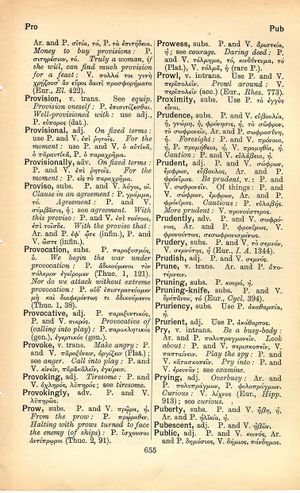proviso
ὅτι τίς ὁ ἄνθρωπος, ὃς ἐπελεύσεται ὀπίσω τῆς βουλῆς τὰ ὅσα ἐποίησεν αὐτήν; (Ecclesiastes 2:12, LXX version) → for who is the man who, after following his own plan, will find wisdom (in) everything he has done?
English > Greek (Woodhouse)
subs.
P. and V. λόγοι, οἱ. Clause in an agreement: P. γράμμα, τό. Agreement: P. and V. σύμβασις, ἡ; see agreement. With this proviso: P. and V. ἐπὶ τούτοις, ἐπὶ τοῖσδε. With the proviso that: Ar. and P. ἐφʼ ᾧτε (infin.), P. and V. ὥστε (infin.).
Latin > English (Lewis & Short)
prōvīsō: adv., v. provideo
I fin. B.
prō-vīso: ĕre, v. n. and
I a., to go or come forth to see (ante-class.): proviso, quid agat Pamphilus, Ter. And. 5, 5, 1: huc proviso, ut, ubi tempus siet, Deducam, id. Eun. 3, 1, 4; id. Ad. 5, 6, 1 (proviso duas res significat: procedo et video, Don.).—With acc.: si quem hominem exspectant, eum solent provisere, to be on the lookout for him, Plaut. Stich. 5, 1, 2.

